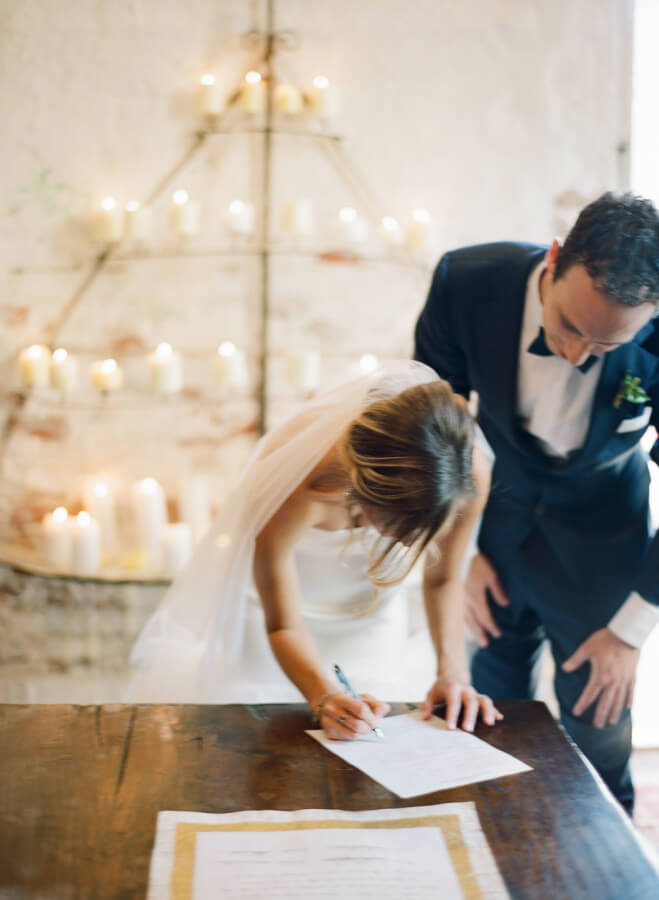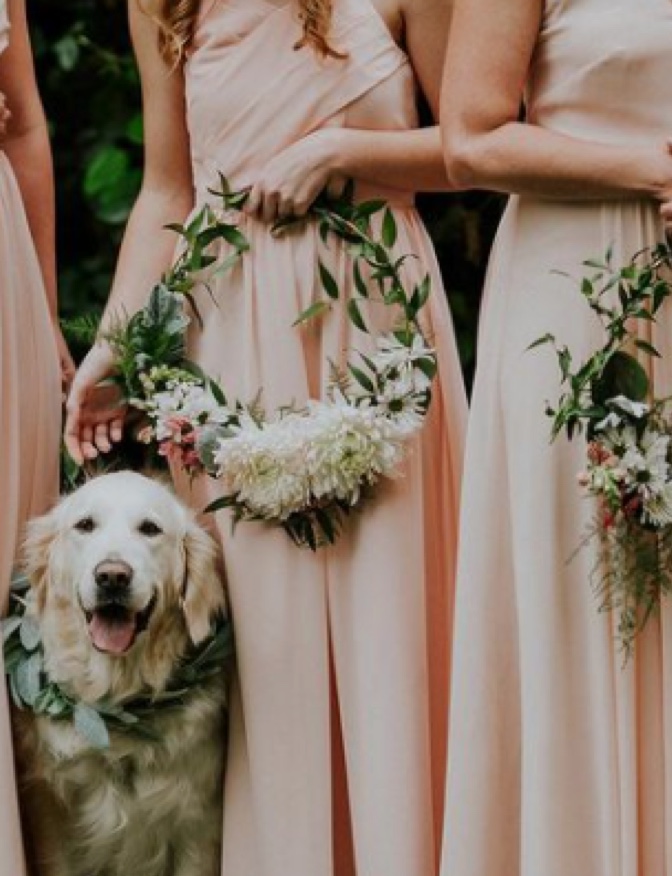This time of the year, the wedding season would normally be in full swing. But as COVID-19 upends life everywhere, couples in the middle of planning their wedding are faced with uncertainty as they try to plan and prepare in case their celebration is affected. We have seen some unconventional wedding ideas start to emerge. Some couples have decided to elope, while others have tied the knot online on Zoom with their guests in attendance via a livestream. So if you're trying to plan your wedding and have decided to keep it small and simple, consider these two alternatives to the traditional wedding: an elopement or a micro wedding.
What exactly is a micro wedding? How is it different from an elopement? And how do you go about throwing one? Keep reading and we'll go over the ins and outs of these emerging wedding trends.

Photo: Lindsay Roman
WHAT’S A MICRO WEDDING?
A micro wedding is a celebration that features most of the customs of a traditional wedding, except on a smaller scale with usually no more than 50 guests. Different from an elopement, which is usually planned in secret by the couple with no guests or only a handful of guests, a micro wedding is a full-on wedding celebration, complete with a ceremony, dinner, and dancing—just with a tiny guest list.
With the Center for Disease Control, World Health Organization, and government recommendations advising against large social gatherings, micro weddings present a clever be there to still witness you exchange your alternative wedding option. Couples may decide to shift away from big blowout celebrations to cozier, more intimate weddings with just their nearest and dearest. And it's not hard to see why.
Planning, postponing, or rescheduling your wedding date and coordinating these changes with your wedding vendors is no doubt a very challenging task. There are many moving parts and the situation continues to be very fluid and rapidly changing. Adding to the difficulty is the fact that so many engaged couples are in the same boat, all trying to secure the very-limited weekend dates still available in 2020. Not to mention the fact that it's impossible to gauge how comfortable guests would feel about traveling somewhere to attend your wedding. Enter the micro wedding! By forgoing a large celebration and hosting a tiny wedding instead, you can still celebrate—safely. Plus, generally speaking, having a micro wedding is a budget-friendly way to keep overall wedding costs low. And logistically, it's a whole lot easier to plan and organize an epic party for 20 guests than it would be for 200.
Intrigued? Keep reading to figure out if a micro wedding or an elopement is best for you and your partner.

Photo: Emm & Clau
HOW TO PLAN A MICRO WEDDING
Pick a venue first.
Having a much smaller guest list opens up a world of venue options for your micro wedding. Choose a place that's meaningful to you both and be sure to consider some out-of-the-box locations. take advantage of this opportunity to tie the knot in a unique space that wouldn't accommodate a larger guest list. If possible, choose a location where you can have both the ceremony and reception on the property; this way, guests won't have to travel from one venue to another. An added bonus is it will be much more cost-efficient, too. Here are some unique venues to consider for your micro wedding:
- Restaurants: Make a list of your favorite local spots and then inquire if they have any private spaces available for a super small wedding.
- Hotel suites/penthouses: If weather permits, have your ceremony outdoors on the hotel grounds or even the rooftop, followed by dinner in a suite or a private room at the hotel's restaurant.
- Galleries: A local art gallery would be such a modern and chic space for an intimate wedding.
- Cafes: Once the coffee shop closes for the day, you and your crew could turn your favorite cafe into a cozy party space.
- Local parks/gardens: Perfect for an alfresco ceremony and wedding reception.
- Wine bars/breweries: Your favorite local watering hole could be the perfect place to exchange "I dos." Plus, you won't have to worry about the drink menu because it's already guaranteed to be delicious.
- Private home: A private home is typically quite challenging logistically for a large guest list but could work well for a much smaller group.

Photo: Kurt Boomer
Make it legal.
Once you've figured out where to hold the wedding, then you'll need to get your marriage license to officially tie the knot. Marriage license requirements vary widely depending on location, but in most states, you can go to the county clerk's office to get a license (you might need to make an appointment beforehand). Some states have an expiration date on the marriage license, so you'll need to make sure your wedding ceremony takes place within the time window.

Photo: Brian D Smith Photography
Book your vendors.
Even if you're only inviting, say, 20 guests, you should still include all of the traditional elements that will make your wedding feel like, well, a wedding. This includes invitations, flowers, dinner, dancing, cake, and any other details that are important to the both of you. Below we have listed out the wedding vendors you should consider hiring for your micro wedding. Keep in mind that these vendors are most likely small business owners that are also struggling with the chaos of postponed events, re-organized schedules, and lost revenue. If your budget is tight, rather than trying to play hardball and negotiate down their hourly rates, instead work with your vendors to see how they may be able to scale down their offering or hours accordingly to fit with your wedding budget, all while helping support local businesses.
- Wedding planner or wedding coordinator: While you may not need a full-service wedding planner, it's still a good idea to book a pro to manage the wedding day itself. Inquire if the wedding planner offers basic, more pared-down packages or hourly rates.
- Photographer: Regardless of how small your wedding is, you'll definitely want to hire a professional photographer to document the day. If your budget is smaller, talk to a photographer about creating a custom package for a shorter amount of time (i.e., six hours of photography instead of eight, which would mean they might skip the "getting ready" hair and makeup shots). Minted has a great database of photographers by state that you can use to kickoff your search.
- Videographer: If you're on the fence about hiring a videographer, we recommend considering it, especially if you're opting for a micro wedding. One of Minted’s partner wedding planners Sarah Carroll, of Small Shindigs in New York, agrees and suggests sending the video afterwards to other loved ones who were not able to attend or live streaming the event to a larger audience that may not have been able to attend. "A livestream is a great alternative to allow those who can’t be there to still witness you exchange your vows," she says.

Photo: Rebecca Yale Photography
- Florist: Since you won't need as many floral arrangements, talk to your florist about picking up the few arrangements instead of having them deliver and place them for you.
- Caterer: Good food and booze are crucial to any good party, so work with a caterer on a custom menu that reflects your and your partner's personalities and tastes.
- Cake designer: Some wedding cake specialists have a minimum fee requirement, so keep in mind you might wind up spending just as much on a cake for 50 guests than you would for a cake for 100. Another option may include calling a few local bakeries and sweet shops to create a dessert display that's within your budget.
- Music: There's a lot of flexibility when it comes to entertainment options for your micro wedding. Hire a DJ if you're looking for a more affordable option. You could even create your own Spotify playlist if you're hoping to keep things low-key. But if you and your guests love to dance, then it might be worth it to spring for a live band. Keep the band's size in mind, though. You don't want to have an equal number of band members to wedding guests, since that would feel overpowering and off-balanced. Instead, hire a small group of musicians that feels proportional to the number of guests.
Invite guests.
Let guests in on the festivities by sending wedding invitations to every invitee. Since you're only mailing a small handful of invites, you might have some extra time and energy to make each invitation extra special. You could add accessories to your wedding invitation suite, like printed invitation backers or envelope liners in a coordinating design, belly bands to wrap all of the cards together, customized wax seals to elegantly close the envelopes, and personalized postage stamps that feature your names, initials, or even a photo. Or, you could choose letterpress-printed invitations, which have a luxurious look and feel. Since your guest list is limited, plan to include all immediate family on both sides, a few of your closest friends, and be sure to check with your parents if they have a dear friend they would like in attendance (especially if they are helping pay for the celebration).
Go all out with the details.
Since your wedding budget will go further with fewer guests, you could use those extra funds to really enhance some of the details that are most important to you. An amazing photographer would be a great investment! With fewer guests in attendance, the overall atmosphere will feel warm and intimate, and there will be so many meaningful moments that a talented photographer will be able to capture. Another worthy splurge is live music. Perhaps a band for dancing and a string trio for the ceremony and cocktail hour. And of course, there’s the menu. Consider upgrading the dinner courses to include five or seven courses instead of the standard three. You could even add wine pairings to give the reception a fine-dining atmosphere. Wedding favors can be much more personalized, creative, and upleveled.
Spend quality time with each guest.
Scaling back the guest list to a smaller, more intimate size also means you'll be able to spend meaningful time with every person in attendance. Make it a point to have at least one conversation with every guest that night and try to make design and decor decisions that will help create a warm ambiance. Instead of separate tables, seat everyone at a single, extra-long dinner table or arrange the tables in an U-shape so everyone is in full view of the couple and their fellow guests. This will make everyone feel like family. Write a personal note to each guest and have it displayed at their seat at the reception. And ask a few key guests ahead of time if they'd be willing to give a toast during dinner.
Send a wedding announcement afterwards.
Of course, other people will want to know that you’ve tied the knot. Make a list of those who will want to know the happy news and send out a wedding announcement after the fact.

Photo: Katie Grant
WHAT’S AN ELOPEMENT?
Traditionally, an elopement is a wedding with just the couple and their officiant, done in private without telling friends or family members ahead of time. The couple usually announces their marriage news to their loved ones after the ceremony has taken place. These days, however, the definition of elopement has taken on an alternate meaning of marrying in the presence of a small handful of guests, either in a courthouse, city hall, a far-flung destination, or a location that is meaningful to the couple. All elopements require a marriage license from the county where the wedding will take place, an officiant, and a witness (who may or may not know the couple).

Photo: Clara Rice Photography
HOW TO PLAN AN ELOPEMENT
Plan out the details.
Even though you aren't planning a full-on wedding, there are still some elopement ideas and details you'll have to figure out ahead of time. If you're planning a simple elopement at your local courthouse or city hall, you'll need to do a bit of homework to gather all the paperwork your state requires to register for a marriage license. You might also need to consider attire, whether or not you might want to hire a photographer to document the occasion, and perhaps flowers if you were thinking you might want a bouquet, flower crown, or boutonniere.
If you are sheltering in place and don’t have too many options for a gorgeous elopement backdrop, not to worry! For an at-home elopement, wedding planner Sarah Carroll of Small Shindigs suggests incorporating a spot that was meaningful to you growing up as your ceremony backdrop. "That may be a swing set, your kitchen, or the living room—there are so many DIY decor projects that might not have been realistic for a bigger wedding but could work well now," she says.

Photo: Michele Beckwith
If you're planning a more elaborate elopement, you'll also need to consider a location or venue, attire, and certain vendors like a photographer, maybe florist, and perhaps even a day-of coordinator (you might want to look into hiring a wedding planner who specializes in elopements). And if you're opting for a destination elopement, then of course you'll also need to make travel and lodging arrangements.
Prepare for some disappointment.
Keep in mind that some of your loved ones might not be thrilled to find out you've eloped. Be prepared for some hurt feelings and have a gentle and thorough explanation of your reasonings already prepared to hopefully ease the disappointment of family and friends that didn’t get to witness you get wed.
No gifts.
By choosing not to include guests in your wedding, you shouldn't expect to receive wedding gifts, so refrain from creating a gift registry. Some friends and family members may still want to send something, but it is not traditional for couples who elope to register for wedding gifts.

Photo: Sylvie Gil
Celebrate afterwards (if you'd like!).
Many couples choose to host a dinner or a party after their vows to celebrate. For example, you could invite a small group of guests to join you for dinner at a nearby restaurant following your city hall elopement.
Minted wedding planner partner Haydee Duarte, of Blush & White Event and Design House, suggests tying the knot in an intimate ceremony or private elopement now, and then sending out save the dates for a larger celebration at a later date, perhaps at your six months or one-year anniversary. Whatever you decide, it's important to choose a celebration style that feels right to you. And, of course, you could choose to skip a party altogether and simply celebrate with your new spouse.
Send wedding announcements.
Following your elopement, share the happy news to the rest of your friends and family members by mailing a wedding announcement.
We hope this article provided some good insight into alternative and unconventional wedding ideas to consider in 2020. As always, Minted is here to help you achieve the wedding dreams you envision. For additional guidance on wedding planning through the coronavirus pandemic, be sure to read our post for couple’s in every stage of the wedding planning process. Our customer service team is here to answer any design or product questions you may have.

Photo: The Hearnes





